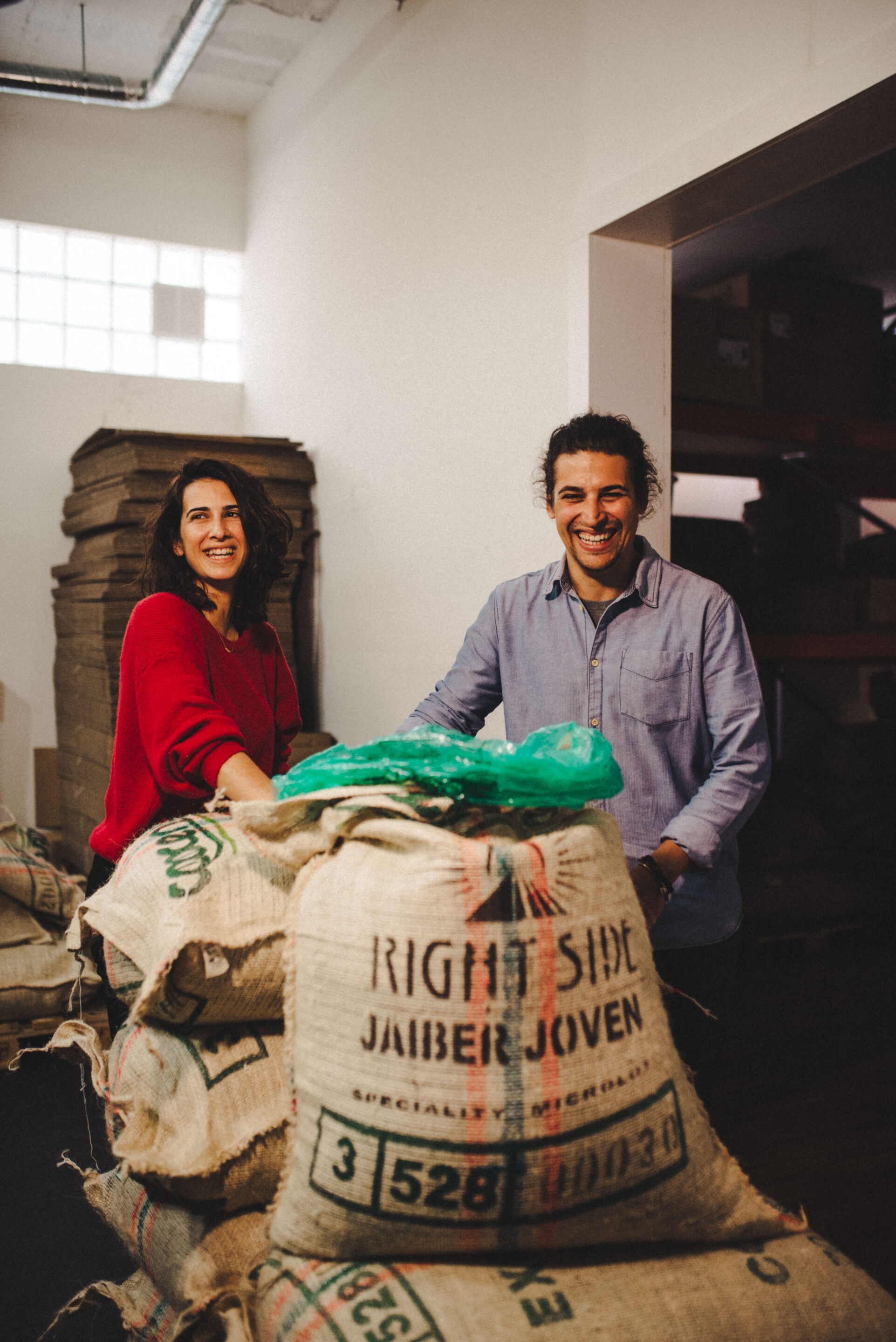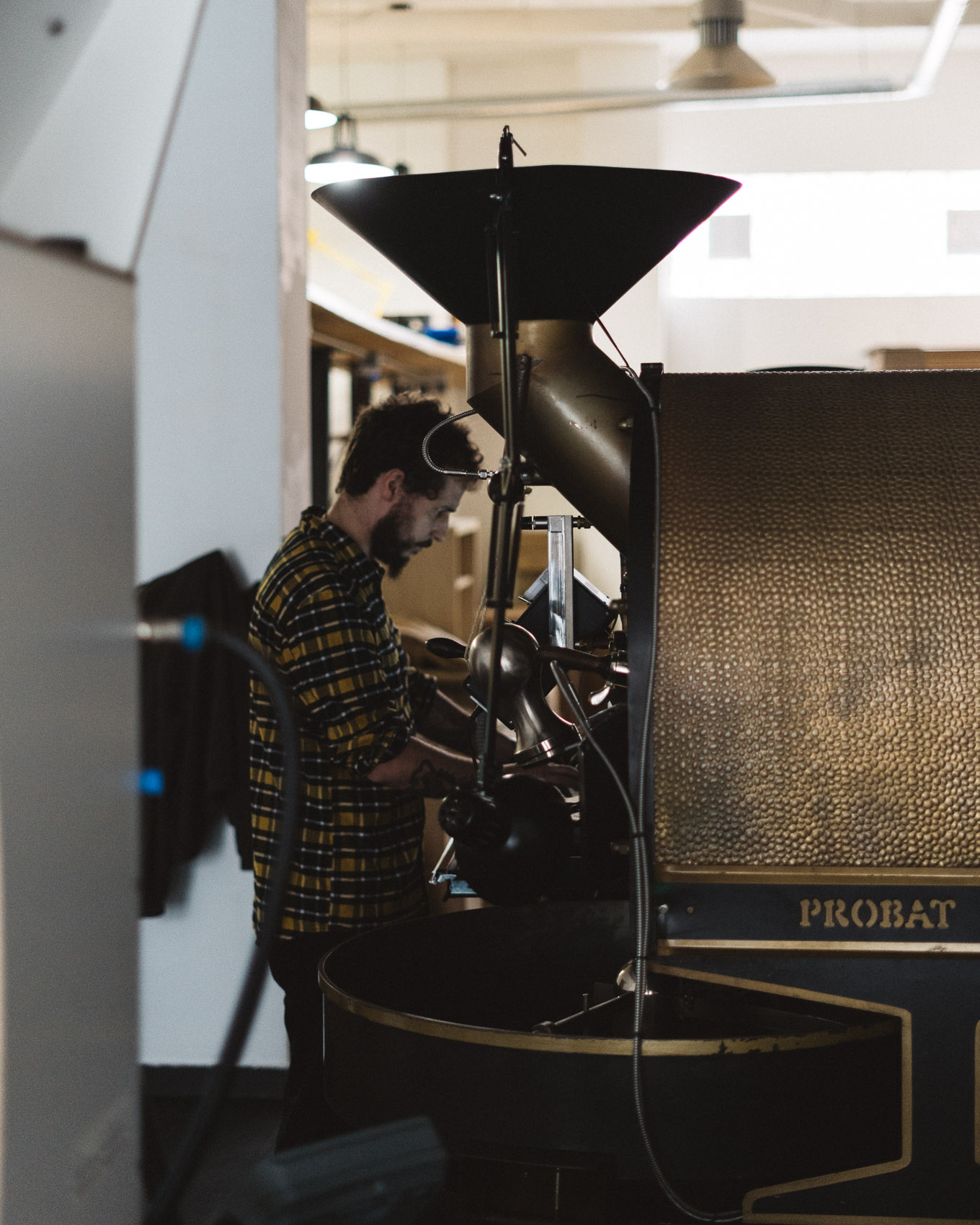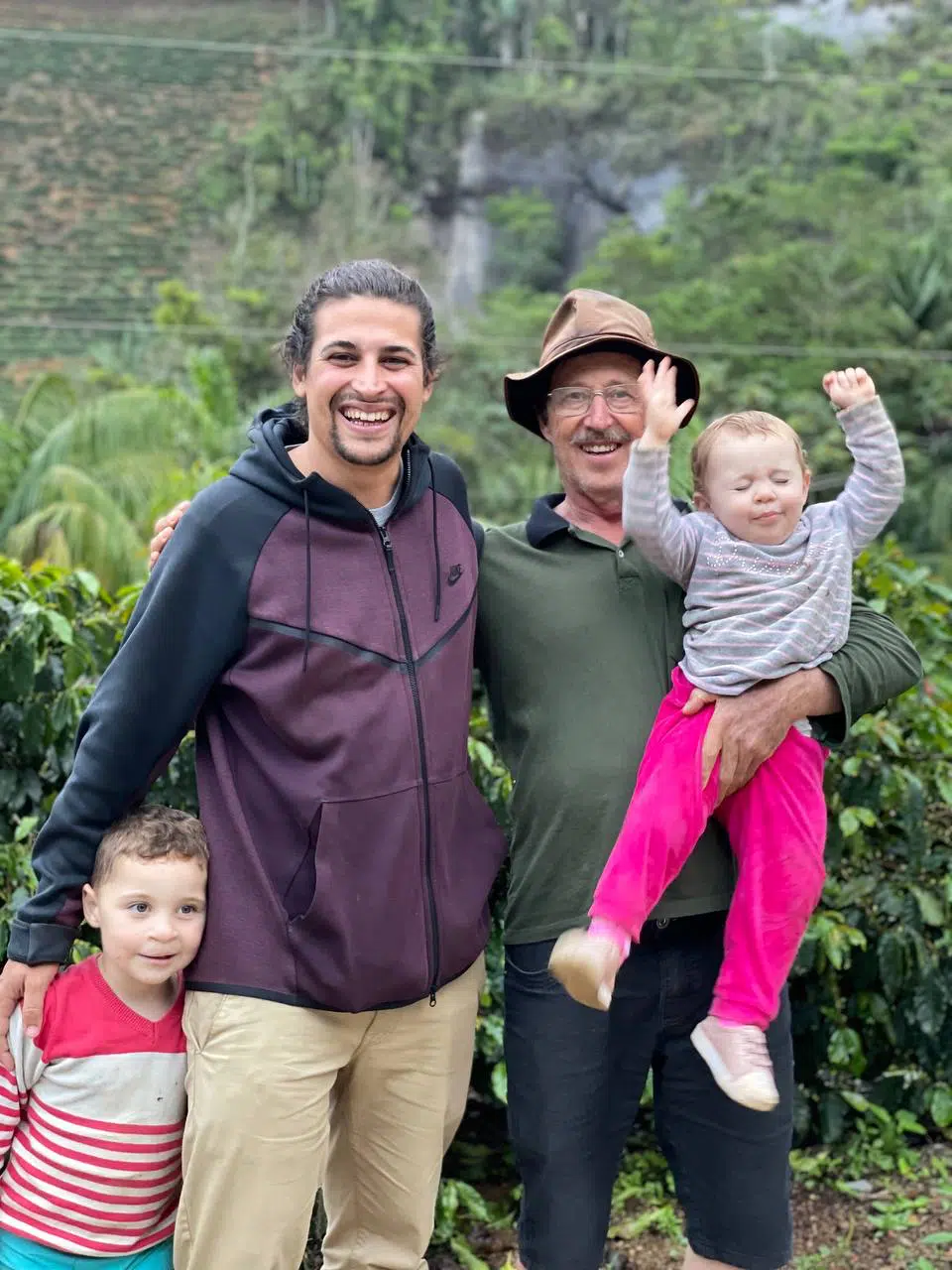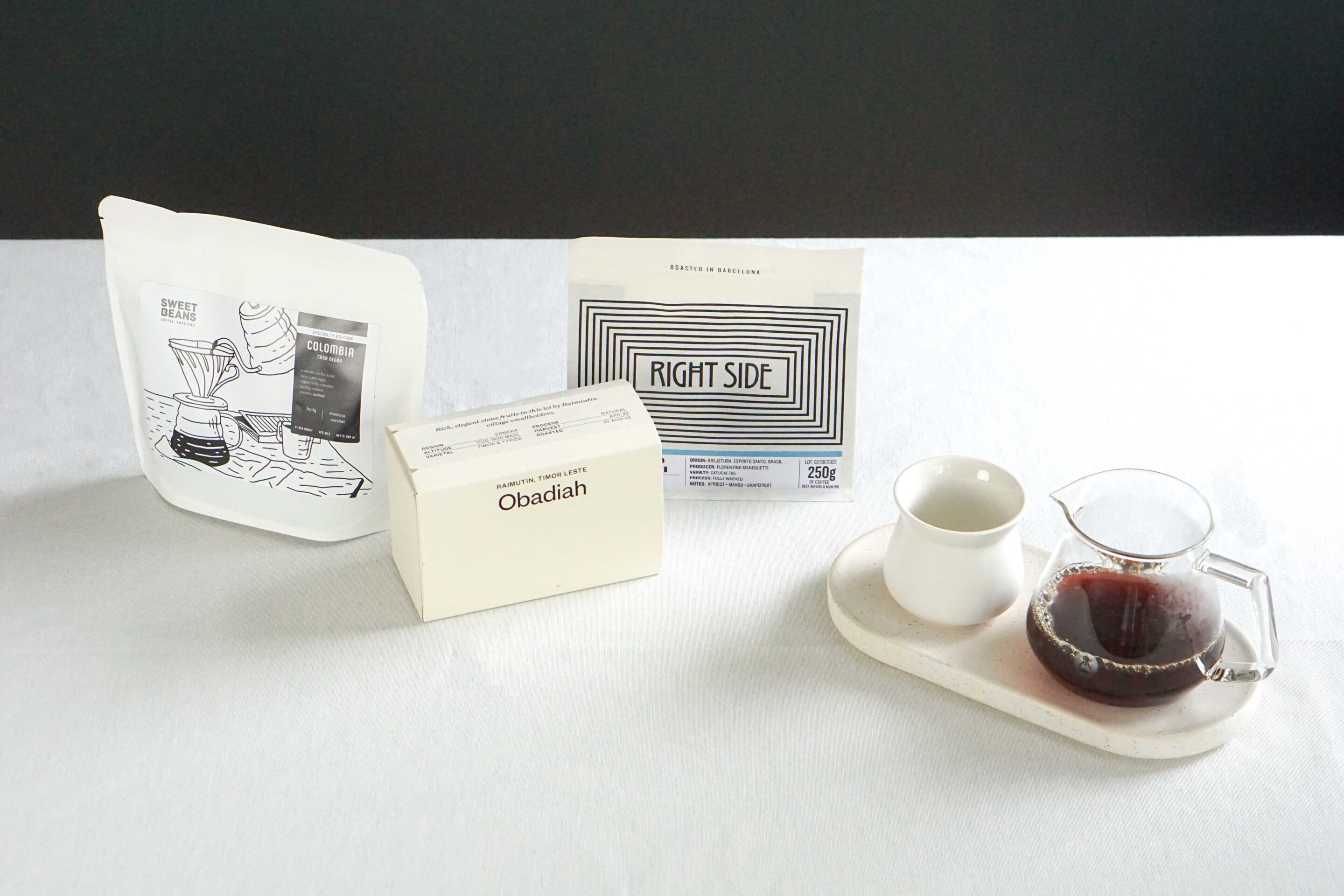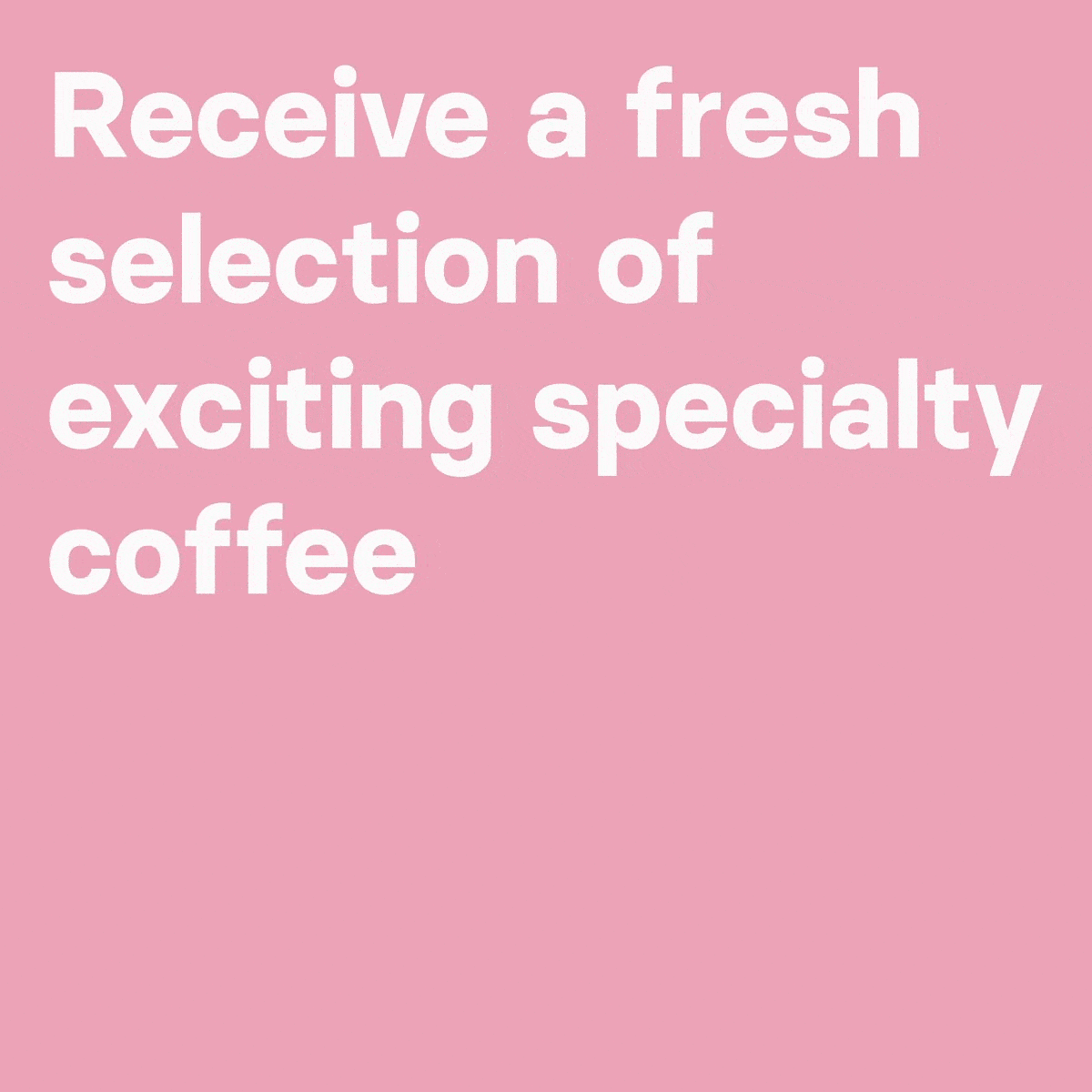When I began my discovery of Barcelona’s nascent specialty coffee scene many years ago, one of the most prominent places was Satan’s Coffee Corner in the Gothic Quarter. This early pioneer of third wave culture worked closely with a local roaster called Right Side, who unlike fellow pioneers Nomad, to name but one, did not have its own flagship café.
To this day, Satan’s and Right Side share a close bond and while many new roasters and cafés have popped up across the Catalonian capital, Right Side has remained a purely wholesale roaster. This has enabled Joaquin Parra, its founder, and his partner in life and in business Lara San Miguel to devote a great deal of their time towards sourcing and roasting extraordinary coffees, of which we have featured a few over the years.
What’s fascinating about Joaquin’s story is that he is one of three sons of Rafa Moral who founded Mare Terra, the largest Spanish specialty coffee importer by volume; the other two sons being Carlos Moral of Hidden Coffee Roasters and Jonathan Moral of Café de Finca.
Joaquin and his brothers were practically born with specialty coffee running through their veins and despite the fact that they’re all based in the area of Barcelona, they don’t see each other as competitors in the traditional sense. Instead, they keep each other on their toes, aiming to continuously raise the bar higher and promote farmers and their fine coffees.
In anticipation of Right Side’s latest Coffeevine feature with a gorgeous washed Brazilian coffee from Florentino Meneguetti, I caught up with Joaquin via video call to find out how things are going, to learn more about his early career journey, Right Side’s ambitious sourcing program and the unique qualities of the Espiritu Santo region of Brazil.
THE COFFEEVINE (TC): “You come from a family dynasty of specialty coffee and maybe you could have decided to do something completely different with your life but instead, you chose to start a specialty coffee roasting company. What was your inspiration to do this?”
Joaquin Parra (JP): “When I got into specialty coffee, I was working as an accountant, something that was really boring. Back then, I thought I could do the corporate life away from my family’s business but I was always helping my dad with his bookkeeping parallel to my job and after a while I realised that an office job like that was simply not for me. After a while, I began working for my family’s business and developed a strong interest in roasting.
At the time, I was working closely with a Spanish Barista Champion and I realised that in competitions it’s all about flavours but only the judges get to taste those coffees. Why?
“When you buy a great product that comes from a real life family, it makes you humble and happy to know that you can contribute towards their livelihood.”
My goal then became to make extraordinary and tasty coffees available to the consumer. I founded Right Side in 2012 and well, I think we should soon have a big party to celebrate our ten year anniversary, no?
Anyway, the point is that because we don’t have our own café, we’ve been able to focus our attention on building longterm relationships with producers because you could be the best roaster, have the best team and the best equipment but if the quality of your raw material keeps changing, then your business will suffer.”
TC: “How do you celebrate Christmas with your family?”
JP: “Well, we have an agreement that we don’t talk about work at Christmas, ha ha.”
TC: “Good call. Can you describe the beginning of your journey. What or who left a big impression on you?”
JP: “My father was developing Mare Terra when I was still studying and as I said, I was helping him with invoices and bookkeeping. At the time, we had Norwegian competition judge and pro-cupper Jon Willanssen working for us and to me, he was like from the future. He had previously worked at Solberg and Hansen, London Coffee School and Mercanta, and he brought so much experience with him. This was around 2007.
In 2008, I attended my first competitions and that is also where I met the founders of Coffee Collective who were just getting started at the time. They were quite a big inspiration for me and I wanted to set up something similar, with the same depth and passion but with my own take on it.”
TC: “From having worked with you before and from reading your blog, I know that you care greatly about your relationships with producers. I am curious to know, do you build on relationships that you have access to via your father’s business or do you specifically go out to build new ones?”
JP: “No, we actually aim to build our fully independent relationships all on our own. We noticed that it was better for our family’s sake to all act independently of each other. At Right Side, we’re a small team with some big personalities and each green buyer has a certain geographical area that they look after. For example, one area is Africa, incorporating Ethiopia and Kenya, and another is Central America. This is actually a good region to start because there are some medium to big producers who are quite easy to contact.
After a while, we realised that there is a huge number of small to medium producers who are doing tremendous work and our focus then became on trying to find these producers and figure out how we can have the biggest economic impact on their lives. Maybe for some this aspect is not so important but for us it really is. When you buy a great product that comes from a real life family, it makes you humble and happy to know that you can contribute towards their livelihood.
It kind of began when I visited a Mexican producer in Oaxaca where I first saw the use of yeasts and different drying techniques for the processing of coffees. Then, when I was in Colombia, I saw how producers were using different techniques to create the super hip anaerobic coffees, often using 84 or 85 points scoring coffees that would then achieve 87 or 88 points purely because of processing.
The consequence is that it’s no longer just about showing up and cupping a bunch of coffees before you buy but actually working with those small producers to share knowledge and guide them towards better scoring coffees, which, we as the roaster, then end up buying.”
TC: “I can imagine that this is the case for Central or South American producers but how do you do this in Africa where buying direct has always been a bit more challenging?”
JP: “In the case of Ethiopia, yes. In the case of Kenya, it’s possible to access small-holder farmers. There are, of course, more intermediaries who facilitate the sale and export and if they have good marketing agents, you can really access great lots. In Ethiopia, which has been changing quite a bit in the last three to four years, we do work with both wet mill owners who represent small-holder farmers as well as people like Helenna Georgalis and various other producers.
What happens often is that the bigger producers have export licenses and sometimes, their neighbours will ask them to export their coffees for them, so you do know where the coffees were produced. I hope that we can soon embark on an origin trip to Africa that my partner Lara is planning as she is the one in charge of buying African coffees.
TC: “You guys don’t have your own café unlike Three Marks, Nomad or your two brothers. Will you never have your own showroom where people can come and taste your coffees and hear your story firsthand?”
JP: “Never say never, right? I mean, we’ve been super fortunate to have always had really great partners like Satan’s who have been representing us very well. We’re really focused on sourcing and roasting and just like we’re unlikely to become producers, we are unlikely to become a café.
“This coffee is really surprising and that is what I look for in the coffees that I source.”
At the same time, it’s true that everything can change in a heartbeat. There is a certain attraction in being able have that direct contact with your customers and to see first hand which coffees work well and which ones don’t. But for now, this is not something that is on the cards.”
TC: “You recently changed your branding, which now looks cleaner and more modern but is still playful. What was the aim with this redesign?”
JP: “Well, it all started during the lockdowns when we had more time to devote to projects like this. The previous bags were quite playful already but we had a lot of different illustrations and it just became quite messy and then when we had the option to work with compostable bags, the choice was simple.
We looked at our typography, which also inspired our logo. We began to study its origins more closely and its creator, Rennie Mackintosh who was an architect and part of the Arts and Crafts movement, and we went from there. The result is something that is a bit hypnotic and the bottom of the bags actually showcases somewhat of a collage of our previous illustrations. The phrase ‘never forget origins’ stands for everything we’re trying to do.”
TC: “Let’s talk about this really fantastic Brazilian coffee from producer Florentino Meneguetti, which we will feature in our September box this year. It was quite an unusual coffee, not just because it’s a washed Brazilian coffee of which I don’t get that many sent to me. And also, because it has a very different kind of flavour profile. It’s more crisp and acidic than what you might expect.”
JP: “I think, to paint the full picture, we need to zoom out a bit and look not only at the huge effort that Florentino is making to produce great coffees but also look at the geography of the Brejetuba region and the state of Espiritu Santo. The same experience you had with this coffee, I also had in 2012 when I was cupping coffees from this producer together with Tim Wendelboe and I said ‘this cannot be a Brazilian coffee!’
I then began to travel more to this region and get to know its characteristics and I was very surprised. Normally, coffees from Brazil come from farms that are very level. This allows for huge industrial production. But this region, in turn, looks more like Colombia albeit without the altitudes. Yet, its proximity to the Atlantic Ocean means that the region has huge temperature differences between day and night. This ensures that the sugars develop really well and that varieties like the Catuaí can produce extraordinary coffees. It’s often called the little brother of Kenyan coffees.
These coffees have a brilliant acidity and are super juicy, and these flavour profiles are not very common in Brazil. For your box, we will roast a Catucai 785 for filter and a Catuaí for espresso.
We cupped all of the producer’s coffees, between 30 – 40, and noticed that there were two main flavour profiles. The Catucai had a more elevated acidity. It’s a bit less sweet but has more complexity. Coffees in Brazil often have ‘surnames’ meaning that there tons of different sub-varieties. They often taste quite similar but in this region, they result in some pretty extraordinary cup profiles that are not unlike the Caturras from other origin countries.
This coffee is really surprising and that is what I look for in the coffees that I source.”
TC: “Where is your next origin trip taking you?”
JP: “I am going to see Fiorentino actually and then from there to Colombia to visit Huila where we’re hoping to buy some delicious coffees.”
TC: “Excellent. I wish you a safe trip and it’s great to have you on board again.”
This coffee is part of our upcoming September 2022 Coffeevine box that also features other delicious coffees from Obadiah and Sweet Beans. To choose your ideal box and get in on the fun, just pop over to our shop now.


